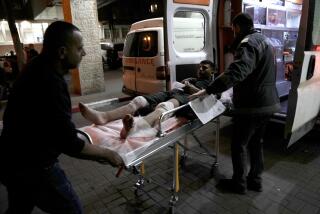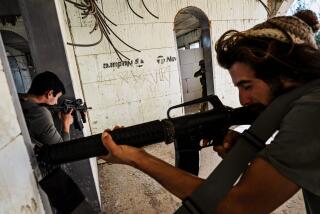5 Farmers, 2 Others Killed in Iraqi Firefight
- Share via
DIJEEL, Iraq — The U.S. tank was rolling past fields of wheat, sunflowers and grape arbors in this impoverished farming village when the attackers struck. By the time the shooting from both sides was over, seven Iraqis were dead.
Lt. Col. Andy Fowler, the commander of the troops involved, said Friday that two of those killed in the Thursday night incident were wearing black uniforms, similar to those worn by the fanatical Fedayeen militia that supported Saddam Hussein’s regime. He said the other five were local people.
Fowler said his men were fired at and fired back.
Residents of this village say that five of those killed were farmers stretched out in their fields under the stars, guarding their sheep and crops.
The incident came during a week of heavy combat in which thousands of U.S. troops stormed through areas north and northwest of Baghdad looking for loyalists from Hussein’s Baath Party, terrorists and paramilitary forces that have been killing American soldiers across central Iraq in a number of small but compounding attacks.
The military says the operations are necessary to help stabilize the country and restore security. But its approach has angered many people in the predominantly Sunni Muslim communities, which once had favored status under Hussein. Many residents charge that the Army has killed and detained innocent people and humiliated the general population.
Dijeel should have been different. It is primarily a community of Shiite Muslims, who were oppressed under Hussein, a Sunni. It also had been largely pro-American.
Then came the ambush and resulting raid. One family buried five of their relatives Friday -- and a sixth was in the hospital.
Elderly women dressed in black robes sat on mats wailing, crying and beating their heads. The soldiers had returned the bodies that morning, and already the victims had been sent for burial in the Shiite religious city of Najaf. They said the soldiers apologized and left.
“We thought they would be better than Saddam Hussein,” said Sabah Ahmed, 32, who lost three nephews in the incident. “They said they were coming here to give us liberty. Where is the liberty?”
Fowler’s account of the incident, given to a reporter earlier in the day at the gate of his nearby base, did not contradict that given by the villagers but did not mention their allegation that his soldiers killed five farmers and injured a sixth in the heat of the chase. Fowler did not respond to several later requests to answer additional questions.
Earlier, he said: “My men have strict orders not to shoot at unarmed civilians day or night. If they had weapons and they were shooting, then my trooper will return fire.” He did say that his soldiers found no weapons in the farmers’ homes.
According to Fowler, about 11:30 p.m. Thursday, two tanks from the 4th Infantry Division were driving along a road that cuts through the farmland and links up with the main highway to Baghdad, about 45 miles to the south. The M1-A1 tanks were rumbling toward their base when attackers set off a large bomb beside the road using wires that ran off into the field.
Fowler said the tank then was hit by automatic-weapons fire and rocket-propelled grenades. His soldiers immediately opened fire and called in backup troops, he said. The tanks were joined by three Bradley Fighting Vehicles. The assailants ran into the fields and fired their weapons back toward the advancing troops.
He said his soldiers chased the attackers into a residential area. The soldiers took control of two houses. They searched for weapons but did not arrest anyone.
When it was all over, they found seven bodies, several rocket-propelled grenades and the battery used to detonate the bomb. U.S. Central Command in Baghdad released a statement saying that 27 Iraqis involved in the attack were killed, and the Pentagon later reaffirmed the figure and the statement that all were involved in the attack. Fowler said that was based on initial reports by his soldiers. “I can only confirm seven dead,” he said.
Razzaq Ali Jassam said that two men in black uniforms charged toward his house in the village after the explosion. He said he stepped outside to see what the commotion was about when he came across one of the men.
“I said: ‘What is happening? Who are you?’ ” he recalled. “They said: ‘The Americans are coming. Leave your houses.’ ”
Then he heard shooting. The Americans had moved in across the fields, shooting rapidly and low. This time of year, the families sleep outside. It is too hot to sleep inside their simple yellow-brick homes, and there is no electricity.
Villagers say that the soldiers likely did not know that Ali Jassim, 80, and his nephew, Kazim Zabar, 19, were sleeping beneath a straw overhang out in their fields to keep an eye on their flocks of sheep. Jassim’s sons Hamza, 39, Abid, 27, and Amr, 24, also were out in the fields.
The soldiers only found out that the men were there, the villagers said, when they recovered their bodies the next morning.
More to Read
Sign up for Essential California
The most important California stories and recommendations in your inbox every morning.
You may occasionally receive promotional content from the Los Angeles Times.













